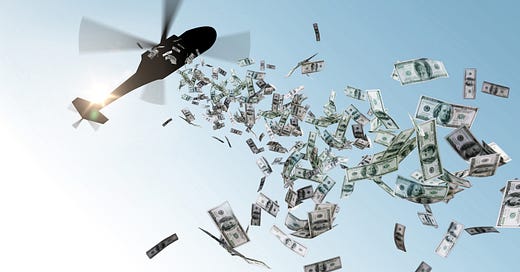The Coming Coronavirus Recession Calls for “Helicopter Money”
Faced with a new kind of economic downturn, an old idea of Milton Friedman’s could ensure the slump is short and shallow.
If ever there were a time for Milton Friedman’s “helicopter money” idea, this would be it. With the stock market in free fall despite interest rates at zero percent and with aggregate demand plunging, the government sending a check to those most likely to spend it quickly would be the most efficient and equitable way to stabilize the economy.
To be sure, there is nothing that economic policymakers can do to stop the coronavirus supply-side shock from sending the U.S. economy into a recession. Indeed, no amount of interest rate cuts, tax reductions, or public spending increases are going to prevent the coronavirus epidemic from having workers locked down, global transport systems upended, events canceled, and international supply chains disrupted.
This makes it all too likely that the U.S. economy will contract in the second quarter by at least the annualized 5 percent rate that Goldman Sachs and others are forecasting.
However, there is much that economic policymakers can and should do to prevent an otherwise short and unavoidable economic recession from growing into a major global recession à la 2008-2009. This is particularly the case considering that aggregate demand could be falling off a cliff.
Aggregate demand is likely plunging not only because the coronavirus is heightening feelings of economic insecurity among both households and businesses, but also because the pandemic has caused the equity market to plummet. U.S. equities have now declined by one third in value, wiping out more than $ 9 trillion in household wealth. According to the Federal Reserve’s estimates, a sustained decline in household wealth alone could subtract about 2 percent from GDP.
Yet another reason to fear that aggregate demand could dry up without bold intervention is that the epidemic-induced recession will bring in its wake a wave of corporate defaults. In particular, with oil prices having collapsed and travel having been restricted, the shale oil and transport sectors of the economy will eventually find themselves in distress. A series of defaults could burst the credit bubble caused by years of ultra-easy monetary policy, which in turn could usher in a nasty credit crunch.
By now it should be clear that the Federal Reserve has little ammunition left in its arsenal to provide the much-needed boost to the economy. Unlike on the eve of the 2008 Lehman bankruptcy when interest rates were 5 percent and when the Fed’s balance sheet was lean, on the eve of the coronavirus epidemic interest rates were already down to 2 percent and the Fed’s balance sheet was bloated. Worse yet, over the past week, the Fed used the little room it had to cut interest rates and to further increase its bond buying, and even those measures failed to stop the stock market’s continued decline.
Now that the Fed has depleted its ammunition, fiscal policy would seem to be the only game left in town to support an economy in danger of entering a doom-loop. However, with projected budget deficits of 5 percent of GDP for as far as the eye can see, it is now more essential than ever that any fiscal stimulus be timely, targeted, and temporary.
Enter Milton Friedman. Back in the 1970s, Friedman proposed a thought experiment: If a helicopter dropped money all over the country, that money he argued would be spent quickly, jumpstarting the economy.
In more practical terms, Friedman’s helicopter money would involve the government sending out a check to those most likely to spend it, and having the Fed finance that government program on the easiest of terms. In addition to quickly boosting the economy, such a course of action could be used to address our inequality problem, especially if the helicopter drop were to be concentrated on those at the lower end of the income scale.
Hopefully, the rout on Wall Street will concentrate minds in both the Administration and Congress. Elected officials at the state and national level should give up on the idea that a recession can be avoided, and they should focus on ideas like helicopter money that could spare us from a repeat of the Great Recession.










